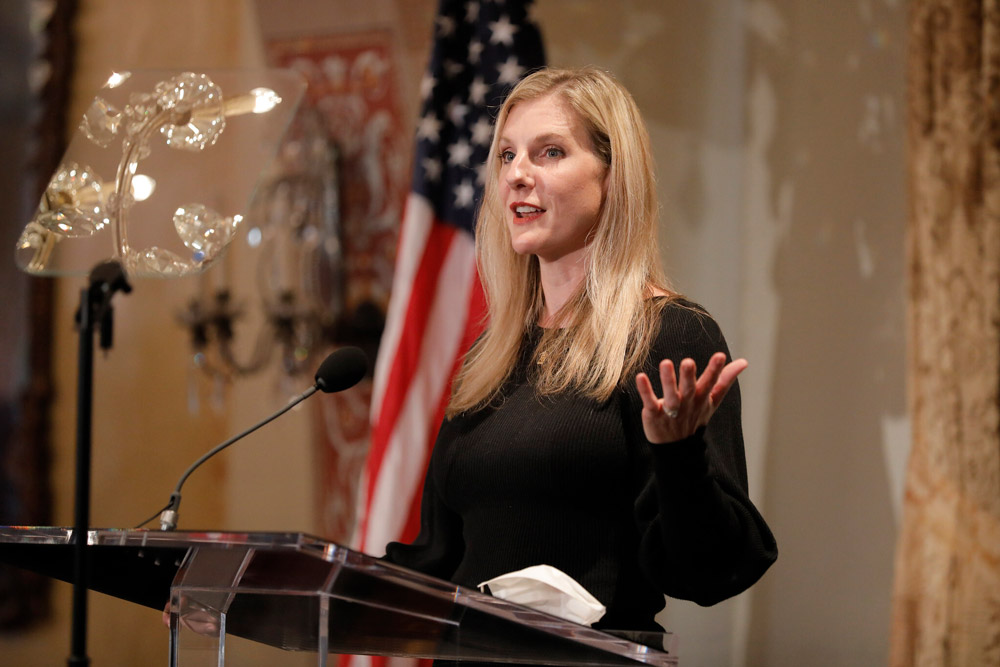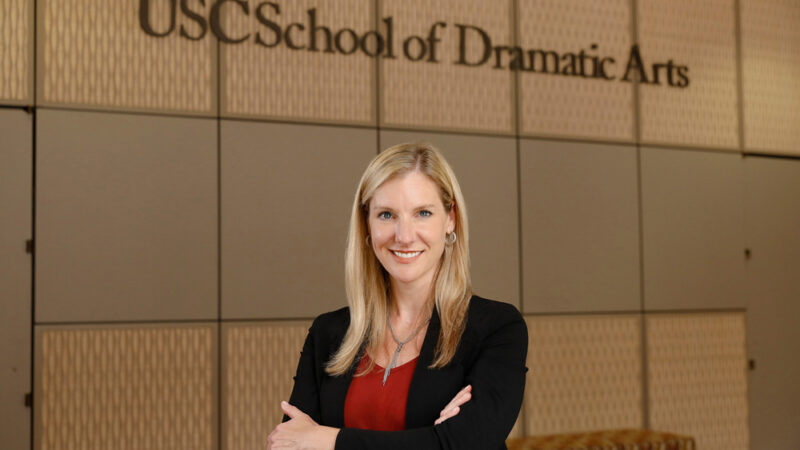Emily Roxworthy, whose appointment at SDA began July 1, is a scholar-artist with degrees in theatre arts, literature, and performance studies from Cornell University (MA) and Northwestern University (BS and PhD). She was most recently on the theatre and dance faculty of the University of California, San Diego, where she also served as Associate Vice Chancellor of Faculty Diversity and Equity, Provost of Earl Warren College, and Associate Dean of the Graduate Division.
Dean Roxworthy has a national reputation as founder and artistic director of Workplace Interactive Theatre, a company that uses role-playing to help employees find solutions to diversity and inclusion problems in their workplaces.
Read a recap of Dean Roxworthy’s installation, as well as view photos and a video.
She also is the creator of an educational video game prototype, Drama in the Delta, that used digital roleplay technology to recreate life in a Japanese American internment camp during World War II. Dean Roxworthy is also the author of two scholarly books, The Spectacle of Japanese American Trauma (2008) and The Theatrical Professoriate (2020).
Callboard interviewed Dean Roxworthy recently for the following Q and A:
Q: What makes the dramatic arts necessary in the 21st century?
Dean Roxworthy: What’s so unique about theatre is that it’s this ancient storytelling technology that just never really goes away. For centuries, we’ve been talking about the death of the theatre. It never goes away because it’s so necessary and necessary now more than ever. We always talk about the theatre as a place of healing: a spiritual, but not religious, coming together. One of the origins of theatre is, of course, ancient Greece, but one of the differences between theatre then and theatre now is that, in ancient Greece, a third of the citizens came out to each of these huge performances and today we are not touching anywhere close to that proportion of the population. We’ve learned a lot of lessons from the pandemic about ways we can provide better access and reach.
The reason theatre is so healing, and I’ve experienced this in my own work with my theatre company, is that it’s really a place where we can wrestle with what it means to be human on a human scale. Having a human up in front of us telling a story, putting themselves on the line, and translating really complex, complicated issues and conflicts down to a human scale helps us get to a place where people can not only empathize but start to problem solve and figure out ways to intervene.
I think that this experience of confronting complicated issues and conflicts through theatrical storytelling should be something very central on the USC campus — theatre should be an experience shared across campus not only because it makes us culturally literate, but it also helps us move forward as a society and as a community. SDA is so excited to be renovating the historic building at Hoover and 34th Street as our new drama center and, when it opens in 2023, it’s going to be so central on campus. I want it to be a place where the whole Trojan community comes together.
What is it about teaching that appeals to you? Do you have examples of working with students that have stuck with you through the years?
What appeals to me about teaching in general is the idea of empowering students to be active participants in the world — active producers and consumers of culture as well as critics of culture. I don’t usually teach acting classes, but I teach classes to actors so they can think of themselves as creative in all sorts of different ways.
With that said, my favorite thing to do is involve non-theatre people in the making of theatre. I’ve seen what that does, not just to the self-esteem of young people, but also to involve scientists and other really cerebral people in making theatre in an interactive way, which is what my theatre company is all about. Everybody has some story of when theatre has touched them, and to be able to be actively involved is really magical. It has so much potential for social change as well.
During summer, a course I would often teach is public speaking, which is a required course for undergraduates who plan to go to graduate school for pharmacy. These are usually science, technology, engineering and math (STEM) students who had never gotten up in front of a group of people to speak or perform. Some of them are intimidated by simply standing up and introducing themselves. To go from that to being able to give a powerful seven-minute persuasive speech was just so incredible to watch.
For STEM students, often you’re teaching the only arts class they will ever take. At UCSD, I also taught large film classes — including one on animation, which was really fun because we got to connect students of every major to this fundamental part of their childhood. When I taught Toy Story, I taught them about all the craft behind making that film, and suddenly they’re revisiting their childhood at this moment that they’re becoming adults at college. And I always, in all of my classes, require some kind of performance or “maker” assignment. In this course, the requirement was to make a stop-motion animated short film. And students said “I’ve never done anything like this before. How on earth am I going to do this?” That’s really, really fun to see them do something they never thought they could do and showcase it in front of their peers. It’s really wonderful.

What is it that made you most excited to join the community of artists at the School of Dramatic Arts?
What I think is really unique about SDA is how pluralistic our approach to theatre training is. It ticked a whole lot of boxes for me. Obviously, I’m very involved with theatre for social change, and to actually have an Institute for Theatre & Social Change while simultaneously offering a degree in musical theatre — that was a huge draw for me. Despite the fact that I’m not a musical theatre artist, I’m hugely passionate about musical theatre, especially socially engaged musical theatre.
Do you have a favorite?
I have several [socially engaged musicals that] I’ve been obsessed with over the past 10 years. The two top ones are Allegiance, the first Broadway play ever about the Japanese American internment experience from World War II. It was a star vehicle for George Takei, the Star Trek icon and social media star. As a small child, he was interned at a camp in Arkansas.
Allegiance is a musical about the Heart Mountain concentration camp, which was in Wyoming. It premiered at the Old Globe in San Diego and then went on to Broadway. I actually wrote a scholarly article comparing my video game with Allegiance. The premise comes from The Producers — what’s the worst idea in the world for a musical? You assume that, right up there with a musical about Hitler, is a musical about the internment experience or a video game about the internment camps. And yet something really profound happens when such an entertaining medium and such a serious topic are brought together in the right way.
I also love Come From Away, about 9/11, which premiered at the La Jolla Playhouse and also went to Broadway. And of course, I’m a huge fan of Rent.
You were saying how pluralistic SDA is. Any other examples?
Yes, the BFA acting program and how it’s been transformed for stage, screen and digital media. It’s training students to be media agile, and adapt their talents to any medium. Last season, I checked out a few SDA productions [that were online during this past academic year] and what was so interesting to me about them is that it’s very clear they were using Zoom really intentionally instead of just trying to translate live in-person production onto Zoom. You saw the actors playing to the laptop camera in very specific ways, using the framing of the Zoom screen. It wasn’t even cinematic, it was specific to Zoom.
[SDA comedy professor] Kirstin Eggers told me she would say to her students: “This might be our last chance, guys. We might never get to perform on Zoom again. We’ve got to do everything amazing that can be done on Zoom while we still have the chance.” Which I thought was a great way to turn the limitations of the pandemic into a virtue.
I think that’s what SDA is doing. It’s empowering students in all these different mediums by teaching them how their talents can be applied to the opportunity at hand, so they can figure out what they want to do with their unique voice and how they want to impact the world when they graduate.
Looking ahead five years, what major things do you hope you will have accomplished at USC?
My top goal relates to the fact that I think SDA should be recognized and ranked, frankly, much higher than it is, given the strengths of the programs here. My job is to very effectively tell SDA’s incredible story. We’re zeroing in on articulating an identity for the School that is about how students are empowered through pluralistic training to go out and change the industry, which starts and ends with a rigorous grounding in the craft of theatre.
We’re really proud of the diversity of our recent cohorts of undergraduates and the historic diversity of our MFA dramatic writing and acting programs. And we’re trying to train and empower students who can then go out and change the entertainment industry in all its different forms. And so that’s a really great story.
In fact, I also would like to grow the graduate offerings of the School in terms of professional master’s training in various areas, including how the dramatic arts can be used to advance equity, diversity and inclusion in all sorts of industries, particularly entertainment and higher education. My interactive theatre work is inspired by Augusto Boal’s Theatre of the Oppressed, which has also inspired [SDA professors] Brent Blair and Anita Dashiell-Sparks, so we have critical mass in terms of artists and scholars at SDA who can offer this kind of training to working professionals who want to change their own fields. It’s essential that we share the magic of theatre-making with the world.
This article appeared in the 2021-22 issue of Callboard magazine. Read more stories from the issue online.
